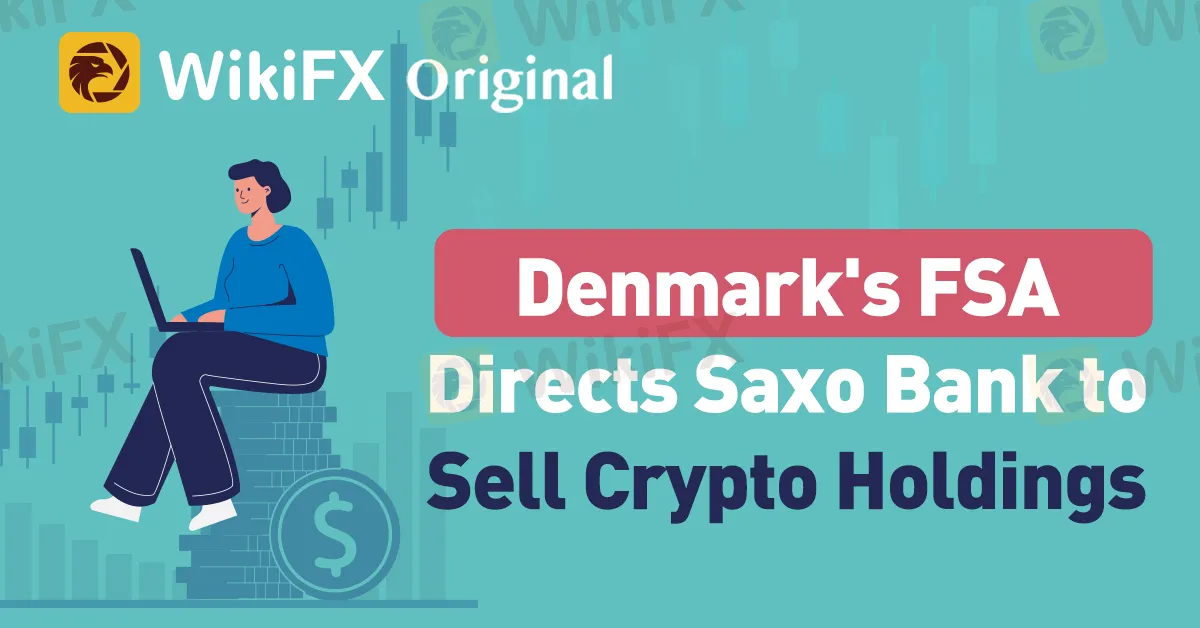简体中文
繁體中文
English
Pусский
日本語
ภาษาไทย
Tiếng Việt
Bahasa Indonesia
Español
हिन्दी
Filippiiniläinen
Français
Deutsch
Português
Türkçe
한국어
العربية
Denmark's FSA Directs Saxo Bank to Sell Crypto Holdings
Abstract:Denmark's financial regulator, the Danish Financial Supervisory Authority (FSA), has directed Saxo Bank to divest its cryptocurrency holdings, citing that it falls outside the bank's authorized activities, while Saxo Bank reports a decline in forex trading volumes for June 2023.

Denmark's financial regulator, the Danish Financial Supervisory Authority (FSA), has instructed Saxo Bank to divest its cryptocurrency holdings, citing that the bank's trading of digital assets for its own accounts falls beyond the scope of its authorized activities as an investment bank.
Saxo Bank, known for its specialization in online trading and investment, offers a comprehensive range of financial products and services, including online trading in stocks, bonds, commodities, forex, contracts for difference, fiat currencies, and cryptocurrencies.
The FSA explains that while Saxo Bank hedges its crypto assets to align with the market risk associated with its digital asset products, the trading of cryptocurrencies is not listed among the supported activities in Appendix 1 of the Danish Financial Business Act.
The financial watchdog further emphasizes that unregulated trading of crypto assets can erode trust in the financial system, and legitimizing such trading would be unjustified for reasons of financial stability, as per Section 24 of the Danish Financial Business Act. Additionally, the FSA notes that crypto trading among financial institutions remains unregulated as the full enforcement of the European Union's Markets in Crypto-Assets (MiCA) regulation is slated for December 30, 2024.

Saxo Bank acknowledges the FSA's decision and expresses its intention to thoroughly review and consider an appropriate response. The bank highlights that its customers gain exposure to cryptocurrencies without direct ownership, and its limited crypto portfolio serves primarily as a risk hedge for facilitating crypto assets, with the majority of exposure being mitigated through exchange-traded and cleared products. Saxo Bank believes that the FSA's decision will have minimal impact on its business operations and client experience.
In terms of trading volumes, Saxo Bank reports an 8% decline in forex trading volumes for June 2023, amounting to $119.5 billion, with the daily average decreasing by 5% to $5.4 billion. Comparing the figures to the same period last year, the drop in total forex volume for June 2023 is more significant, showing a 22% decline from $152.5 billion, while the daily average volume experienced a 21% decrease from $6.9 billion.
Since the beginning of 2022, Saxo Bank's monthly forex trading volumes have shown fluctuations, hitting a low of $102.8 billion in April, the lowest volume since December 2021. However, volumes rebounded, reaching $130.5 billion in May, only to decline once again in June.
Across all markets, Saxo Bank witnessed a 4% decrease in trading volumes, totaling $391.7 billion. The trading volumes for commodities and fixed income experienced significant declines of 21% and 13% respectively, amounting to $32.1 billion and $6.6 billion. Conversely, trading volume in equities displayed a 2% increase, rising from $228.2 billion in May to $233.5 billion in the last month.

Disclaimer:
The views in this article only represent the author's personal views, and do not constitute investment advice on this platform. This platform does not guarantee the accuracy, completeness and timeliness of the information in the article, and will not be liable for any loss caused by the use of or reliance on the information in the article.
Read more

BaFin Issues Warnings Against Unauthorised Crypto and Investment Platforms
BaFin has recently flagged multiple websites, including stcwelt.com and mega-platz.pro, for offering financial and cryptoasset services without proper authorisation. Stay informed and protect your investments.

CryptoCurrency Regulations in India 2025 – Key Things You Should Know
Cryptocurrency has become a major trend in today’s world. Crypto Experts believe it’s the future, which is why many people are investing heavily in it. But before jumping in, it’s important for crypto enthusiasts to understand the key rules about cryptocurrency in India.

Global Brokers Vs. Indian Rules: Why They Struggle in India
RBI issued a warning last year against 75 forex brokers. Those brokers are globally popular and regulated in other countries, but they are banned in India. Only few brokers even have physical offices located in India. So, why do global brokers face so many challenges in entering the Indian market?

Tokenized Stocks: Innovation or Just Another Wrapper?
While tokenized stocks promise global, round-the-clock trading, many platforms only offer synthetic exposure similar to CFDs. Without shareholder rights or deep liquidity, their added value remains in question.
WikiFX Broker
Latest News
Global stock markets are calling Trump's bluff on tariffs
Trump's tariffs overshadow the pomp and pageantry as Macron meets King Charles
Boeing delivers most airplanes since late 2023 after ramping up 737 Max output
Inflation expectations drift back down to pre-tariff levels, New York Fed survey shows
MT4 vs MT5: A comprehensive comparison in terms of functionality
Top Forex Trading Strategies for the London Session
Swissquote Takes Full Control of Yuh Digital Finance App in Major Deal
Top 5 Forex Pairs Every Trader Should Have on Their Radar
What WikiFX Found When It Looked Into Decode Global
Treasury yields rise as Trump's new tariff rates in focus
Currency Calculator


